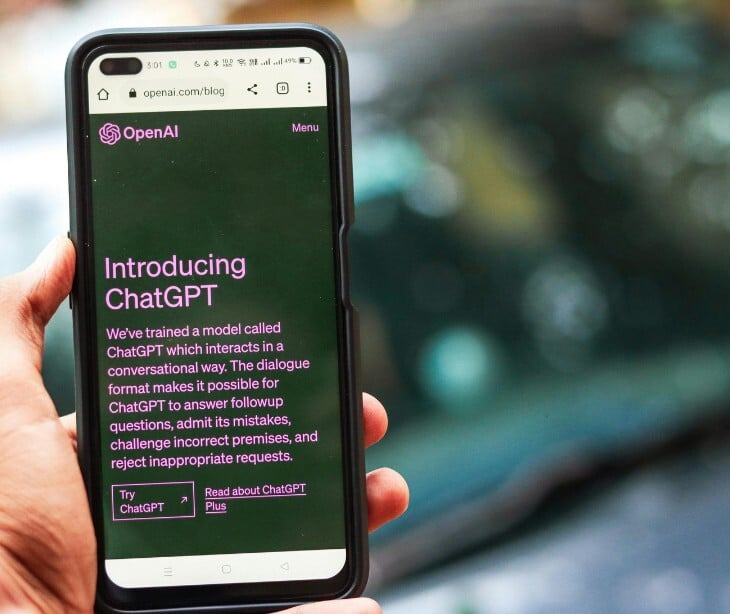
To help healthcare professionals harness the potential of AI-powered chatbots, here's an extensive list of 100+ ChatGPT prompts tailored to the unique needs and challenges of the healthcare industry. These prompts guide A.I. chatbots in generating valuable insights, recommendations, and content, enabling healthcare professionals to save time, increase efficiency, and provide better patient care.
This article is organized into 12 sections, each focusing on a specific area of healthcare:
- Patient communication
- Medical documentation
- Medical research
- Healthcare policy and ethics
- Medical education and training
- Interdisciplinary collaboration
- Public health and prevention
- Medical practice management
- Mental health and wellbeing
- Healthcare marketing and outreach
- Patient privacy and data security
- Telemedicine and remote patient care
Each section includes several use cases and three prompts designed to guide chatbots in generating relevant, actionable information.
As AI and ChatGPT continue to revolutionize the healthcare industry, the integration of chatbots and AI-powered solutions will only become more critical. By utilizing these chatbot prompts, healthcare professionals can use the power of A.I. today to transform their practice and deliver better patient outcomes.
Writing effective A.I. chatbot prompts
To ensure your chatbot generates meaningful responses, craft clear and concise prompts. Here are a few tips:
- Be specific: Clearly state your expectations and requirements for the chatbot's response. Mention the format, word count, and any other relevant parameters.
- Use open-ended questions: Encourage more thoughtful and comprehensive answers by asking open-ended questions rather than those that can be answered with a simple "yes" or "no."
- Keep it simple: Avoid using overly complex language or technical jargon. Ensure your prompts are easily understandable by the chatbot.
- Provide context: Offer background information or context to help the chatbot understand the subject matter and deliver more accurate responses.
- Iterate and refine: Experiment with different phrasings and approaches to find what works best for your specific needs. Be prepared to make adjustments and refinements to your prompts as needed.
Don't enter PHI in ChatGPT without a BAA
While all data inputted into ChatGPT is encrypted in transit and at rest, a search of their documentation and the web does not indicate that OpenAI will sign a business associate agreement (BAA). While they state they remove personal data, entering PHI into ChatGPT may still be a HIPAA violation.
Before engaging with a third-party chatbot provider, verify their compliance with HIPAA or similar data protection regulations. Be mindful of the risks of sharing sensitive information, and implement safeguards to maintain patient confidentiality.
To avoid potential patient privacy breaches, refrain from including PHI in any prompts submitted to A.I. chatbots.
Go deeper:
Patient communication
Explaining medical conditions and treatments
- Prompt: "Explain [medical condition] in simple language for a newly diagnosed patient. Give me 3 examples. You have 200 words max for each explanation."
- Prompt: "Describe the treatment options for [medical condition]. Provide 3 examples, each within 150 words."
- Prompt: "Summarize the causes and risk factors for [medical condition]. Create 3 concise explanations with a maximum of 100 words each."
Addressing patient concerns and questions
- Prompt: "A patient is worried about the side effects of their prescribed medication for [medical condition]. Write 3 responses addressing their concerns and providing reassurance. Each response should be no more than 150 words."
- Prompt: "A patient has concerns about the cost of their treatment for [medical condition]. Write 3 responses discussing financial assistance options and resources. Limit each response to 150 words."
- Prompt: "A patient is hesitant to undergo a recommended medical procedure for [medical condition]. Write 3 responses addressing their fears and providing information about the procedure. Each response should be no more than 200 words."
Creating empathetic and supportive messages
- Prompt: "Write 3 empathetic and supportive messages for patients who have received a [serious medical diagnosis]. Each message should be no more than 200 words."
- Prompt: "Craft 3 messages of encouragement for patients struggling with the challenges of managing a chronic condition like [medical condition]. Limit each message to 150 words."
- Prompt: "Compose 3 messages to help patients stay motivated and engaged in their treatment plan for [medical condition]. Each message should be no more than 200 words."
Medical documentation
Writing case summaries and patient histories
- Prompt: "Create a case summary for a patient with [medical condition]. Give me 3 examples. You have 250 words max for each summary."
- Prompt: "Write a patient history for an individual with [medical condition]. Provide 3 examples, each within 300 words."
- Prompt: "Summarize the key findings from a patient's diagnostic tests for [medical condition]. Create 3 concise summaries with a maximum of 200 words each."
Drafting progress notes and treatment plans
- Prompt: "Compose 3 progress notes for a patient undergoing treatment for [medical condition]. Each note should be no more than 150 words."
- Prompt: "Develop a treatment plan for a patient with [medical condition]. Write 3 examples, each limited to 250 words."
- Prompt: "Create 3 examples of follow-up recommendations for a patient recovering from [medical condition]. Each recommendation should be no more than 200 words."
Creating referral letters and discharge summaries
- Prompt: "Write a referral letter for a patient with [medical condition] to see a specialist. Provide 3 examples, each within 250 words."
- Prompt: "Craft 3 discharge summaries for a patient who has been treated for [medical condition]. Limit each summary to 300 words."
- Prompt: "Compose 3 examples of post-discharge care instructions for a patient who has been treated for [medical condition]. Each instruction should be no more than 200 words."
Medical research
Summarizing research articles and clinical trials
- Prompt: "Summarize a research article about [medical condition] or its treatment. Give me 3 examples. You have 250 words max for each summary."
- Prompt: "Write a brief overview of a clinical trial related to [medical condition]. Provide 3 examples, each within 200 words."
- Prompt: "Create a concise summary of the key findings from a recent study on [medical condition]. Develop 3 examples with a maximum of 150 words each."
Generating ideas for research topics
- Prompt: "Propose 3 research topics related to [medical condition] that would be valuable for further study. Each topic should be accompanied by a brief explanation of its significance, within 100 words."
- Prompt: "Suggest 3 innovative approaches to investigating the causes or treatments of [medical condition]. Provide a brief description of each approach, limited to 150 words."
- Prompt: "Identify 3 gaps in the current understanding of [medical condition] that could be addressed through future research. Provide a concise explanation for each gap, within 100 words."
Preparing abstracts and conference presentations
- Prompt: "Write an abstract for a research paper on [medical condition]. Provide 3 examples, each within 250 words."
- Prompt: "Create a conference presentation outline for a study related to [medical condition]. Develop 3 examples, each limited to 300 words."
- Prompt: "Compose 3 talking points for a panel discussion on recent advancements in the treatment of [medical condition]. Each talking point should be no more than 150 words."
Healthcare policy and ethics
Discussing current healthcare policies and their impact
- Prompt: "Analyze the impact of a current healthcare policy on patients with [medical condition]. Give me 3 examples. You have 250 words max for each analysis."
- Prompt: "Discuss the potential consequences of a proposed change in healthcare policy for [medical condition] treatment. Provide 3 examples, each within 200 words."
- Prompt: "Explain how a specific healthcare policy affects healthcare providers treating patients with [medical condition]. Create 3 concise explanations with a maximum of 150 words each."
Debating ethical dilemmas in medicine
- Prompt: "Present 3 ethical dilemmas related to the treatment of [medical condition]. For each dilemma, provide a brief description and discussion of the potential consequences, within 200 words."
- Prompt: "Describe 3 ethical challenges healthcare professionals may face when managing patients with [medical condition]. Provide a brief analysis of each challenge, limited to 150 words."
- Prompt: "Explore 3 potential conflicts of interest that may arise in the context of treating [medical condition]. Offer a concise explanation for each conflict, within 100 words."
Analyzing the implications of new technologies in healthcare
- Prompt: "Examine the potential benefits and drawbacks of a new technology used in the treatment of [medical condition]. Provide 3 examples, each within 250 words."
- Prompt: "Discuss 3 ethical considerations related to the use of a specific healthcare technology for managing [medical condition]. Develop 3 examples, each limited to 200 words."
- Prompt: "Evaluate how a new technology might affect the patient experience and healthcare delivery for those with [medical condition]. Compose 3 analyses, each no more than 150 words."
Medical education and training
Developing educational materials for medical professionals
- Prompt: "Create an educational resource about [medical condition] for medical professionals. Give me 3 examples. You have 250 words max for each resource."
- Prompt: "Design a training module outline for a new treatment approach for [medical condition]. Provide 3 examples, each within 200 words."
- Prompt: "Write a case study on a patient with [medical condition] for medical students to analyze. Create 3 concise case studies with a maximum of 300 words each."
Preparing teaching materials for patient education
- Prompt: "Develop a patient education handout on [medical condition] and its management. Create 3 examples, each no more than 200 words."
- Prompt: "Design a visual aid, such as an infographic or flowchart, to help patients understand the treatment process for [medical condition]. Provide a brief description of 3 examples, limited to 150 words each."
- Prompt: "Create a list of frequently asked questions (FAQs) and their answers for patients with [medical condition]. Compose 3 sets of FAQs, each containing 5 questions and answers, with a maximum of 250 words per set."
Facilitating medical workshops and training sessions
- Prompt: "Outline a workshop agenda for healthcare professionals to learn about new advancements in the treatment of [medical condition]. Provide 3 examples, each within 300 words."
- Prompt: "Develop a role-play scenario for a training session on effective patient communication for individuals with [medical condition]. Write 3 scenarios, each limited to 200 words."
- Prompt: "Design an interactive learning activity for medical students to improve their understanding of [medical condition]. Compose 3 activity descriptions, each no more than 150 words."
Interdisciplinary collaboration
Facilitating communication between healthcare professionals
- Prompt: "Draft an email to inform an interdisciplinary team about a patient with [medical condition]. Give me 3 examples. You have 250 words max for each email."
- Prompt: "Compose a meeting agenda for an interdisciplinary team discussing the treatment plan for a patient with [medical condition]. Provide 3 examples, each within 200 words."
- Prompt: "Write a summary of a patient's case to be shared with an interdisciplinary team working on [medical condition]. Create 3 concise case summaries with a maximum of 300 words each."
Promoting interdisciplinary collaboration in patient care
- Prompt: "Describe 3 strategies for enhancing interdisciplinary collaboration in the management of patients with [medical condition]. For each strategy, provide a brief explanation of its potential benefits, within 200 words."
- Prompt: "Identify 3 potential barriers to effective interdisciplinary collaboration in the care of patients with [medical condition]. Provide a brief analysis of each barrier, limited to 150 words."
- Prompt: "Propose 3 initiatives to improve interdisciplinary communication and teamwork for healthcare professionals treating [medical condition]. Offer a concise explanation for each initiative, within 100 words."
Sharing expertise and knowledge across disciplines
- Prompt: "Design a seminar or workshop for healthcare professionals from different disciplines to share their expertise on [medical condition]. Provide 3 examples, each within 300 words."
- Prompt: "Create a knowledge-sharing platform or resource for interdisciplinary collaboration on [medical condition]. Develop 3 examples, each limited to 200 words."
- Prompt: "Outline a case conference format for discussing complex cases of [medical condition] with professionals from different disciplines. Compose 3 outlines, each no more than 250 words."
Public health and prevention
Developing public health campaigns and awareness programs
- Prompt: "Design a public health campaign to raise awareness about [medical condition] and its prevention. Give me 3 examples. You have 250 words max for each campaign description."
- Prompt: "Create an outline for a community-based awareness program focusing on [medical condition]. Provide 3 examples, each within 200 words."
- Prompt: "Propose a social media campaign to educate the public on the early signs and symptoms of [medical condition]. Develop 3 concise campaign strategies with a maximum of 150 words each."
Promoting preventive measures and healthy behaviors
- Prompt: "Describe 3 strategies for encouraging preventive measures and healthy behaviors to reduce the risk of [medical condition]. For each strategy, provide a brief explanation of its potential benefits, within 200 words."
- Prompt: "Identify 3 educational resources to help individuals adopt healthy lifestyle habits that may lower the risk of developing [medical condition]. Provide a brief description of each resource, limited to 150 words."
- Prompt: "Suggest 3 community-based interventions to promote healthy behaviors and prevent [medical condition]. Offer a concise explanation for each intervention, within 100 words."
Evaluating the effectiveness of public health interventions
- Prompt: "Outline a study design to evaluate the impact of a public health intervention on [medical condition] prevalence. Provide 3 examples, each within 300 words."
- Prompt: "Develop a set of criteria to assess the success of a public health campaign aimed at preventing [medical condition]. Create 3 sets of criteria, each containing 5 key indicators, with a maximum of 250 words per set."
- Prompt: "Propose 3 methods to gather feedback from the public on a health promotion campaign focused on [medical condition]. Compose 3 method descriptions, each no more than 150 words."
Medical practice management
Improving patient experience and satisfaction
- Prompt: "Describe 3 strategies for enhancing patient experience and satisfaction in a medical practice focused on [medical condition]. For each strategy, provide a brief explanation of its potential benefits, within 200 words."
- Prompt: "Identify 3 key performance indicators (KPIs) to track and measure patient satisfaction in a medical practice treating [medical condition]. Provide a brief description of each KPI, limited to 150 words."
- Prompt: "Propose 3 initiatives to improve patient communication and engagement in a medical practice focused on [medical condition]. Offer a concise explanation for each initiative, within 100 words."
Streamlining operations and workflow
- Prompt: "Develop 3 recommendations for streamlining operations and workflow in a medical practice specializing in [medical condition]. Provide a brief explanation of each recommendation, within 200 words."
- Prompt: "Suggest 3 technological solutions to improve efficiency and organization in a medical practice treating [medical condition]. Offer a concise description of each solution, limited to 150 words."
- Prompt: "Create a process map or workflow diagram for managing patients with [medical condition] in a medical practice setting. Describe 3 examples, each within 250 words."
Staff training and development
- Prompt: "Design a staff training program to improve the understanding and management of [medical condition] in a medical practice. Provide 3 examples, each within 300 words."
- Prompt: "Develop a professional development plan for healthcare staff to enhance their expertise in [medical condition]. Create 3 examples, each limited to 200 words."
- Prompt: "Propose 3 strategies to promote a culture of continuous learning and improvement among healthcare staff in a practice treating [medical condition]. Compose 3 strategy descriptions, each no more than 150 words."
Mental health and wellbeing
Assessing mental health symptoms and concerns
- Prompt: "Create a questionnaire to screen for common mental health symptoms associated with [medical condition]. Give me 3 examples. You have 250 words max for each questionnaire."
- Prompt: "Develop a list of 5 key questions to ask a patient about their mental health and wellbeing related to [medical condition]. Provide 3 sets of questions, with a brief explanation for each question within 150 words."
- Prompt: "Design a mental health assessment tool specific to individuals living with [medical condition]. Create 3 concise tool examples with a maximum of 300 words each."
Providing mental health support and coping strategies
- Prompt: "Outline a support group program for individuals experiencing mental health challenges related to [medical condition]. Develop 3 examples, each no more than 200 words."
- Prompt: "Describe 3 coping strategies for individuals struggling with the mental health impact of [medical condition]. Provide a brief explanation of each strategy, limited to 150 words."
- Prompt: "Suggest 3 resources to help patients manage the emotional and psychological aspects of living with [medical condition]. Offer a concise description for each resource, within 100 words."
Incorporating mental health care into overall treatment plans
- Prompt: "Propose a treatment plan that integrates mental health care for a patient with [medical condition]. Provide 3 examples, each within 300 words."
- Prompt: "Discuss 3 strategies for improving communication between mental health professionals and other healthcare providers treating patients with [medical condition]. Develop 3 examples, each limited to 200 words."
- Prompt: "Create a comprehensive care plan that addresses both the physical and mental health needs of a patient with [medical condition]. Compose 3 care plan examples, each no more than 250 words."
Healthcare marketing and outreach
Developing healthcare marketing campaigns
- Prompt: "Design a marketing campaign to promote a medical practice specializing in [medical condition]. Give me 3 examples. You have 250 words max for each campaign description."
- Prompt: "Create a content strategy for a healthcare organization focused on [medical condition] to engage and educate potential patients. Provide 3 examples, each within 200 words."
- Prompt: "Develop a social media plan to increase awareness of a medical clinic treating [medical condition]. Outline 3 concise strategies with a maximum of 150 words each."
Building community partnerships and collaborations
- Prompt: "Propose 3 initiatives to foster collaboration between a healthcare organization specializing in [medical condition] and local community organizations. For each initiative, provide a brief explanation of its potential benefits, within 200 words."
- Prompt: "Identify 3 potential community partners for a healthcare organization focused on [medical condition]. Offer a concise description of each partner and the potential collaboration, limited to 150 words."
- Prompt: "Outline a plan for organizing a community health fair or event that highlights [medical condition]. Develop 3 examples, each no more than 250 words."
Improving patient outreach and engagement
- Prompt: "Design a patient outreach program to provide information and resources for individuals with [medical condition]. Provide 3 examples, each within 300 words."
- Prompt: "Create a series of educational blog posts or articles targeting individuals living with [medical condition]. Develop 3 content topics, each with a brief description limited to 200 words."
- Prompt: "Develop an email newsletter strategy to engage and inform patients about new treatments, resources, and research related to [medical condition]. Compose 3 newsletter examples, each no more than 150 words."
Patient privacy and data security
Ensuring compliance with privacy regulations
- Prompt: "Outline 3 best practices for maintaining compliance with healthcare privacy regulations (such as HIPAA) in a medical practice treating [medical condition]. For each practice, provide a brief explanation of its importance, within 200 words."
- Prompt: "Develop a checklist for conducting regular privacy audits in a healthcare organization focused on [medical condition]. Create 3 checklists, each containing 5 key items, with a maximum of 250 words per checklist."
- Prompt: "Identify 3 potential privacy risks or vulnerabilities in a healthcare setting that manages patient data for [medical condition]. Offer a concise description of each risk and a suggested mitigation strategy, limited to 150 words."
Implementing data security measures
- Prompt: "Propose 3 data security measures to protect patient information in a medical practice specializing in [medical condition]. Provide a brief explanation of each measure, within 200 words."
- Prompt: "Create a staff training module outline for data security and patient privacy in a healthcare organization focused on [medical condition]. Develop 3 module outlines, each no more than 250 words."
- Prompt: "Discuss 3 strategies for fostering a culture of data security and patient privacy among healthcare staff in a practice treating [medical condition]. Compose 3 strategy descriptions, each limited to 150 words."
Managing data breaches and security incidents
- Prompt: "Design a data breach response plan for a healthcare organization managing sensitive patient data related to [medical condition]. Provide 3 examples, each within 300 words."
- Prompt: "Develop a set of guidelines for healthcare staff to follow in the event of a data security incident involving [medical condition] patient data. Create 3 sets of guidelines, each containing 5 key steps, with a maximum of 250 words per set."
- Prompt: "Outline a communication plan for notifying patients and relevant authorities in case of a data breach involving patient information for [medical condition]. Compose 3 communication plan examples, each no more than 200 words."
Telemedicine and remote patient care
Implementing telemedicine services
- Prompt: "Develop a plan for integrating telemedicine services into a medical practice focused on [medical condition]. Give me 3 examples. You have 250 words max for each plan."
- Prompt: "Outline a process for conducting remote patient consultations for individuals with [medical condition]. Provide 3 examples, each within 200 words."
- Prompt: "Propose 3 strategies for training healthcare staff in providing telemedicine services to patients with [medical condition]. Offer a concise explanation for each strategy, within 150 words."
Enhancing patient experience through telemedicine
- Prompt: "Describe 3 ways to improve patient experience and satisfaction with telemedicine services for [medical condition]. For each way, provide a brief explanation of its potential benefits, within 200 words."
- Prompt: "Identify 3 potential barriers to successful telemedicine implementation for patients with [medical condition]. Provide a brief analysis of each barrier, limited to 150 words."
- Prompt: "Suggest 3 initiatives to promote patient engagement and communication through telemedicine services for individuals with [medical condition]. Develop a concise explanation for each initiative, within 100 words."
Monitoring and managing patient health remotely
- Prompt: "Design a remote monitoring program for patients with [medical condition]. Provide 3 examples, each within 300 words."
- Prompt: "Create a set of guidelines for managing the ongoing care of patients with [medical condition] using telemedicine and remote monitoring. Develop 3 sets of guidelines, each limited to 200 words."
- Prompt: "Propose a plan for using telemedicine to coordinate care among a multidisciplinary team treating patients with [medical condition]. Compose 3 care coordination plan examples, each no more than 250 words."
Get the most out of ChatGPT with well crafted prompts
AI-powered chatbots present many opportunities for healthcare professionals to streamline workflows and enhance patient care. By employing thoughtfully crafted prompts and adhering to privacy guidelines, you can effectively utilize A.I. chatbots to address various challenges within the healthcare industry. Embrace the potential of A.I. to transform your practice, improve efficiency, and ultimately contribute to better patient outcomes.
Subscribe to Paubox Weekly
Every Friday we bring you the most important news from Paubox. Our aim is to make you smarter, faster.

 Dean Levitt
Dean Levitt




